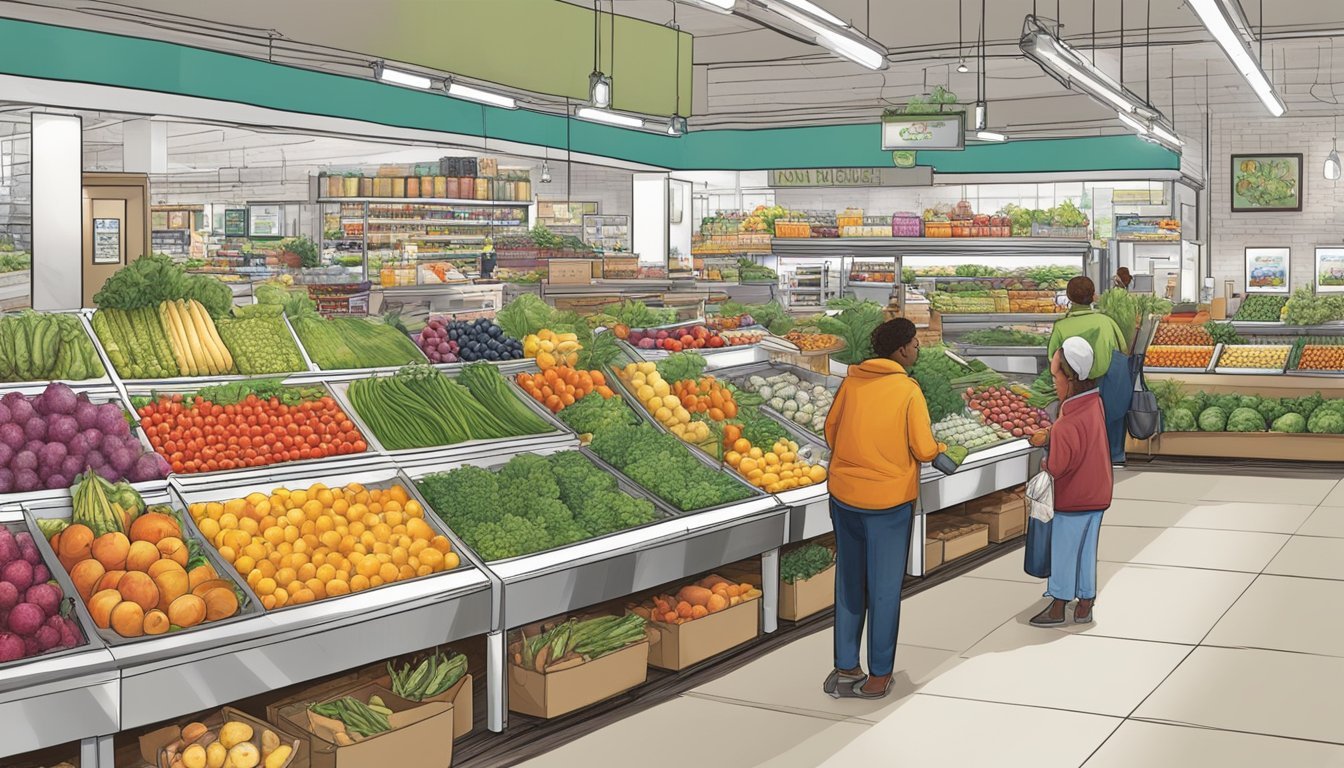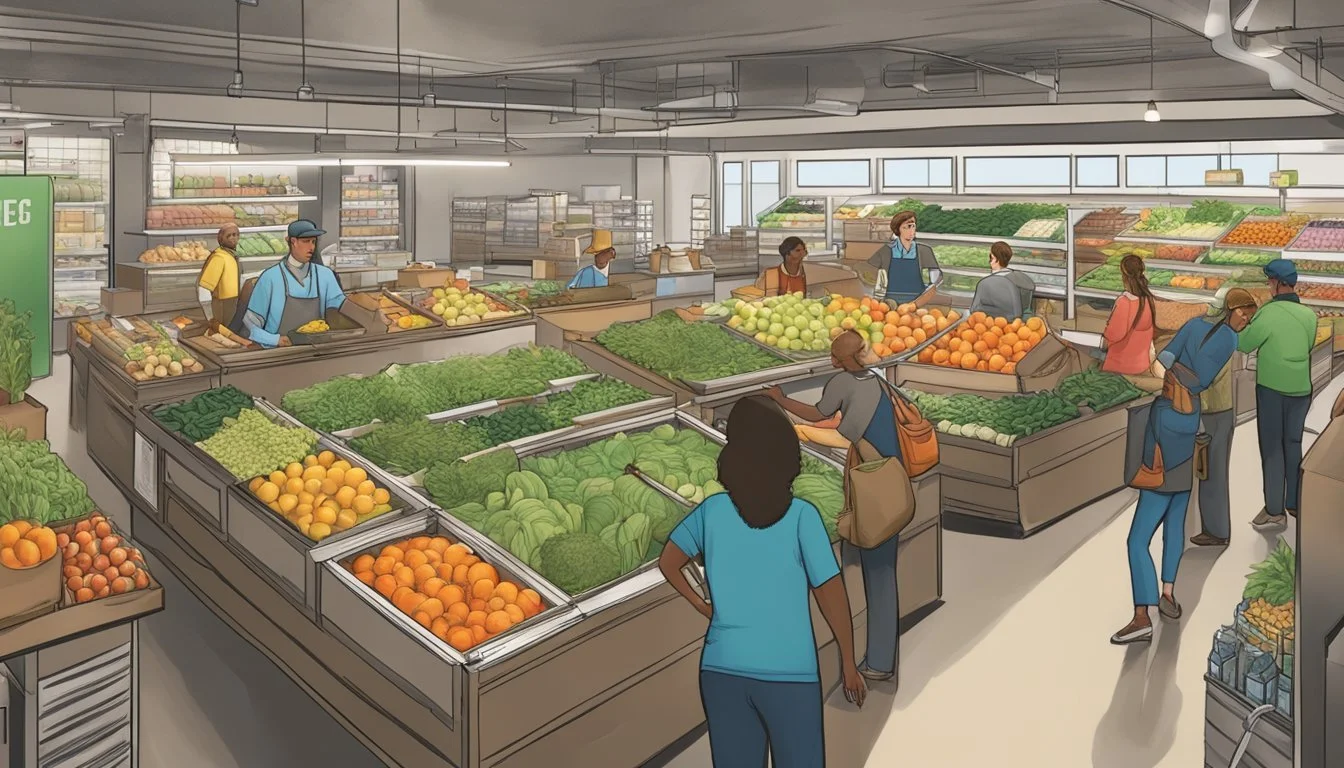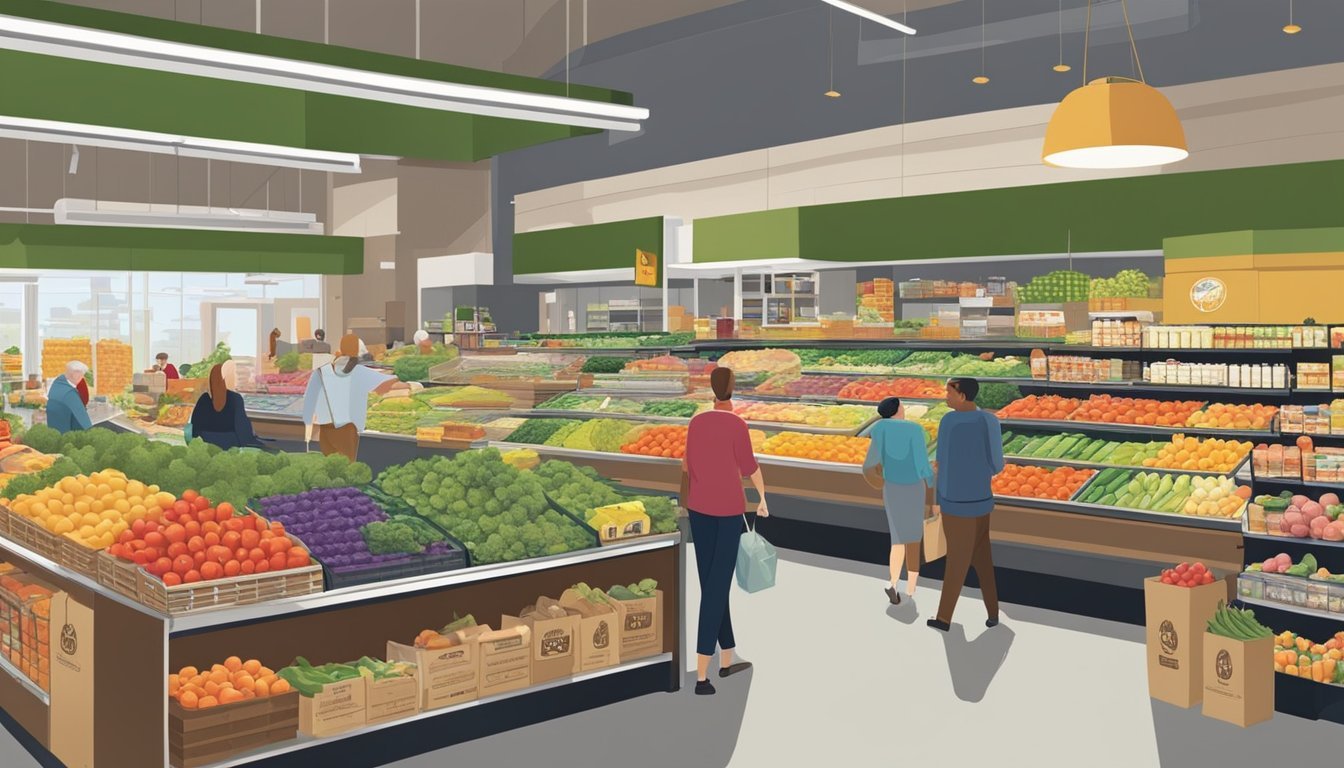Guide to Food Co-Ops in Rochester, NY
Your Essential Shopping Resource
Food cooperatives, or food co-ops, offer a unique approach to buying and economic collaboration, setting them apart from typical commercial groceries. In Rochester, New York, this alternative model emphasizes community ownership, healthy, sustainably sourced products, and ethical business practices. Abundance Food Co-op stands out as Rochester's first and only cooperatively-owned natural grocer, with roots tracing back over 40 years to the Genesee Co-op Natural Foodstore founded in 1968.
Abundance Food Co-op has expanded its mission over the years to cater to the Rochester community by offering a diverse range of products that prioritize nutrition and ecological responsibility. They provide safe, healthful food options at fair prices, giving consumers the option to support a sustainable food system. In addition, the cooperative adheres to the Rochdale Principles, a set of guidelines to which cooperatives worldwide align themselves, involving voluntary and open membership, democratic member control, member economic participation, autonomy and independence, education, cooperation among cooperatives, and concern for community.
By shopping at a food co-op like Abundance, Rochesterians not only gain access to organic and natural foods but also become part of a community effort to cultivate responsible corporate behavior and fair employment procedures. The cooperative is open to the public daily, offering a wide range of goods, from bulk staples and fresh produce to health supplements and gluten-free options, reflective of their commitment to inclusive health and well-being principles.
What is a Food Co-Op?
A Food Co-op is a grocery store platform that operates on a cooperative model, prioritizing the needs and values of its community members. It is characterized by local ownership, democratic control, and a commitment to sustainable and healthful practices.
Principles and Values
Food Co-ops operate on a set of foundational principles that distinguish them from conventional grocery stores. A core facet is community ownership, where the store is owned and governed by the community members who shop there. Decisions are made democratically, often adhering to the Rochdale Principles, which are a set of guidelines established to ensure fair and equitable business practices within cooperatives. These principles underscore a commitment to voluntary and open membership, democratic member control, economic participation by members, and concern for the community.
Benefits of Joining
Individuals who join a Food Co-op gain numerous advantages. Firstly, they have a say in the business operations, as each member typically has an equal vote in decision-making processes, exemplifying the cooperative’s value on democratic control. Economically, members often enjoy discounts on groceries and products, particularly with organic and natural items, which frequently populate co-op shelves. Furthermore, by supporting a Food Co-op, members directly contribute to reinforcing sustainable food systems and having access to healthful, organic produce. Another significant benefit is the strengthening of the local economy, as Food Co-ops regularly foster relationships with local growers and producers, keeping more money circulating within the community.
Understanding Food Co-Ops in Rochester, NY
Food cooperatives in Rochester provide a community-centered alternative to conventional grocery stores, emphasizing local produce, sustainable practices, and a membership-based structure.
History and Evolution
The seed of Rochester's cooperative movement was planted with the Genesee Co-op Natural Foodstore in 1968, a countercultural beacon of not just food supply, but also a hub for alternative health and community engagement. This pioneering spirit transcended decades, eventually evolving into today's modern manifestation—the Abundance Food Co-op. It stands as a testament to the city's progressive embrace of community-owned business models.
Current Landscape
In present-day Rochester, NY, food cooperatives like the Abundance Food Co-op are centers of community involvement, offering a vast array of natural and organic groceries along with vegan and gluten-free options. The Co-op emphasizes support for local food producers, a hallmark distinction from conventional grocers. The Co+op Deals program further enhances the shopping experience by providing members with significant savings on various products. Co-ops in New York State, including Rochester's, are community-owned, member-operated, and strive to create a substantial economic impact, all while fostering local commerce and a healthier food system.
How to Participate in Local Food Co-Ops
Participation in local food co-ops in Rochester, NY, offers individuals the opportunity to become involved as shareholders or through volunteer and employment roles.
Becoming a Shareholder
Becoming a shareholder in a food co-op means becoming a part-owner of the cooperative. Shareholders are often referred to as members, and they buy into the co-op with a membership fee. This fee can vary, but it typically grants the member a say in important decisions during elections, as well as access to special discounts. Membership usually comes with the responsibility to contribute to the co-op's well-being, which can include participation in votes and engagement in community events.
Volunteer and Employment Opportunities
Food co-ops in Rochester also provide community members with the chance to contribute through volunteering or by becoming employees. Volunteers play a crucial role in the day-to-day operations, while employment opportunities may offer a more formal association with the cooperative.
Volunteering: Offers hands-on experience and a chance to learn about cooperative business models. Volunteers may earn discounts or other benefits for their contributions.
Employment: Being hired as an employee affords one the opportunity to work in various positions within the co-op, often with potential career advancement paths. Employees may receive additional benefits compared to volunteers, such as paid time off or health insurance options.
Local Food Co-Op Shopping Guide
Food co-ops in Rochester, NY offer a unique shopping experience that focuses on providing organic and locally-sourced products to the community.
Products and Produce Offered
Shoppers can find a diverse array of goods at Rochester's food co-ops, emphasizing organic food and natural food store philosophies. Here's what customers can typically expect:
Fresh Organic Produce: A wide variety includes seasonal fruits and vegetables procured from local farmers.
Bulk Goods: Items such as grains, nuts, spices, and coffee are available, allowing customers to purchase the exact quantity they need and reduce packaging waste.
Dairy and Eggs: These often come from nearby farms, ensuring freshness and support for local dairy producers.
Meats: Selections of locally raised meats without the use of hormones and antibiotics.
Food co-ops are also attentive to dietary needs, offering a variety of vegan and gluten-free options.
Supporting Local Producers
Food co-ops in Rochester have a strong relationship with local producers and are committed to:
Engagement with Local Farms: Co-ops work with a network of local farms, sometimes upwards of 281 local food producers, substantially more than conventional grocers.
Community Impact: This promotes regional economic stability and provides members with access to the freshest food available.
Sustainability Practices: Purchases from food co-ops contribute to sustainable agriculture and responsible food distribution that often adheres to the Rochdale Principles.
Special Features of Rochester Co-Ops
Rochester, NY, boasts a variety of co-ops that offer community enrichment through educational events and diverse culinary experiences. These cooperatives are more than just grocery stores; they are hubs of activity and engagement.
Educational Events and Community Engagement
Rochester co-ops have established themselves as more than food stores—they are pillars of communiversity. Cooperatives provide an array of educational events, like workshops and classes, that cover topics related to health, sustainable living, and food preparation. They often engage with the local community through events that promote cooperative principles and encourage active participation. The Community Darkroom and the Pottery Studio are examples of such special features that these co-ops offer, going beyond their role as food retailers and fostering both creativity and learning.
Cafe and Deli Options
One of the highlights of Rochester co-ops is the inclusion of Cafe and Eat-in Fresh Organic Deli options. Shoppers can find a selection of:
Books and Gifts: A curated collection of reading material and unique gifts that reflect the cooperative's commitment to education and community values.
Health Products: A wide range of products catered to the health-conscious individual, including alternatives for those with dietary restrictions such as Vegan and Gluten-Free options.
The deli sections are known for their fresh, organic offerings, providing a variety of foods that cater to different dietary needs. It's not uncommon to find a vibrant eatery within these co-ops serving delicious, wholesome food, aligning with their mission for better health and sustainability.
Saving Money with Rochester Food Co-Ops
Rochester's food co-ops offer members and non-members an opportunity to save on grocery expenses without sacrificing quality. Strategy is paramount when seeking to effectively utilize a co-op for savings.
Membership Benefits: Members can access special discounts, which often add up to significant savings over time. By being a shareholder, one may also vote on how surplus funds get reinvested into the co-op, potentially affecting overall affordability.
Co+op Deals Program: This is a bi-monthly sales flyer with substantial savings on popular natural and organic brands. Participation in this program doesn't require a membership and is available to the general public.
Bulk Purchasing: Buying in bulk can cut costs on pantry staples, and co-ops typically offer an extensive selection of bulk goods. Shoppers can purchase only what they need, which helps reduce waste and saves money.
Local Products: Working with an average of 281 local producers compared to conventional grocery stores' 65, co-ops can offer competitive prices on local items. Supporting local producers often results in lower transportation costs and fresher products for consumers.
Discounts & Options Description Non-working memberships Pay an annual fee for a discount on purchases. Working memberships Contribute labor for greater discounts. Seasonal Sales Take advantage of seasonal produce at reduced prices. Special Discounts Additional discounts for students, seniors, and more.
By leveraging membership advantages, participating in sales programs, buying in bulk, and choosing local products, shoppers can markedly reduce their food expenses while supporting a community-oriented shopping experience.
The Future of Food Co-Ops in Rochester
Rochester's food co-operatives are poised to continue their expansion with a dedication to social responsibility and a sustainable food system. They play a vital role in providing access to certified organic and non-GMO products to the community.
Sustainable and Responsible Growth
Food co-ops in Rochester prioritize sustainability and responsibility in their growth strategies. These co-operatives are committed to:
Supplying products that are certified organic and free from genetically modified organisms (non-GMO).
Offering goods sourced from local and sustainable farms to reduce carbon footprint and support the local economy.
Further development plans involve increasing their range of eco-friendly products and minimizing waste through better resource management. These initiatives aim to ensure that the food system remains robust while aligning with eco-conscious consumer values.
Expanding the Food Co-Op Network
The expansion of the Rochester food co-op network is expected to:
Extend the availability of healthful, organic, and local food options to a broader segment of the population.
Enhance community engagement through cooperative membership and local partnerships.
As this network grows, it will reinforce the linkage between consumers and food producers, fostering a more resilient and equitable food system for the region.
Comparative Analysis with Other Grocery Options
In Rochester, NY, food co-ops offer a different experience compared to traditional grocery stores such as Wegmans or specialty health food stores like Lori's. This section systematically examines the differences in prices and quality, as well as the community impact between these options.
Comparing Prices and Quality
Prices: Food co-ops often feature competitive prices for organic produce, which may be less expensive than those found at Wegmans, a chain known for its wide assortment but also higher price points for premium products. Lori's, focusing specifically on health and organic offerings, might present a similar cost bracket as food co-ops but can vary depending on brand and sourcing.
Organic produce: Food co-ops excel in providing local, sustainably sourced organic produce, which often translates into fresher options for consumers. While Wegmans also offers an extensive organic section, they deal on a much larger scale which can affect the freshness compared to the locally grown produce at co-ops.
Community Impact
Sustainable practices: Food co-ops prioritize local, sustainable sourcing, positively impacting the local economy by keeping more revenue within the community. As per data, food co-ops spend 38% of their revenue locally, with 19% going directly into local benefits and wages.
Health initiatives: Co-ops frequently extend beyond just being a grocery store by promoting health through educational programs and inclusive trade policies, supporting minority-owned suppliers. The inclusive trade programs not only bolster equity within the community but also ensure a diverse selection of products.
Wegmans, although often involved in community events and charity, operates on a larger scale which might dilute the intensity of local impact when compared to food co-ops. Lori's has a strong health focus but on a smaller, more specialized scale, possibly limiting its overall community reach.
Thus, consumers in Rochester looking for organic options might find food co-ops a viable alternative, especially when considering the added community benefits.
Frequently Asked Questions About Food Co-Ops
What is a food co-op?
A food cooperative, or food co-op, is a grocery store owned by members who purchase shares. Co-ops focus on providing their communities with natural, organic, non-GMO, and locally sourced products.
How does a co-op benefit its members?
Members often enjoy benefits like discounts on purchases, a say in the business via the board of directors, and a potential share in the profits.
What type of products can I find in a food co-op?
Co-ops typically offer a variety of products including:
Bulk Goods: Grains, nuts, spices
Fresh Produce: Often prioritizing organic and local options
Dietary Specific Goods: Catering to vegan, gluten-free, and other diets
Are co-ops part of the natural and organic food movement?
Yes, they often embody the principles of the movement by emphasizing sustainability and health.
What is CSA and is it related to co-ops?
Community Supported Agriculture (CSA) allows individuals to subscribe and receive seasonal produce directly from local farms. Many co-ops partner with CSA programs to support local agriculture.
How can I join a co-op?
To become a member, you typically buy a share or pay a membership fee, which contributes to the capital of the co-op and entitles you to its benefits.
Do I have to be a member to shop at a co-op?
Non-members can usually shop at a co-op but may not receive the discounts or other benefits that members enjoy.
Is there a co-op in Rochester, NY?
Yes, the Abundance Food Co-op is one example located in Rochester, NY, offering a range of products aligned with the co-op principles.
Conclusion
Food co-ops in Rochester, NY, serve as a testament to the community’s commitment to healthy, organic, and environmentally responsible food options. These cooperative entities stand not just as food retailers but also as pillars of community enrichment and education. They provide a platform for local producers, ensuring that the benefits of organic produce are accessible and the ethos of sustainability is spread throughout the community.
Rochester's Abundance Food Co-op is exemplary of this effort. It adheres to the Rochdale Principles, which are guidelines to ensure equitable operation of cooperatives. It is an establishment where one can expect to find a wide variety of organic products, reflecting the cooperative's mission to offer nutritious food at reasonable prices. Moreover, as a cooperatively-owned enterprise, it ensures that the voices of its community are heard and valued.
Food co-ops are more than mere grocery stores; they are entities that rally for food justice and education. They encourage residents to make informed decisions about their consumption habits, fostering an informed and empowered consumer base. By supporting such ventures, one also supports the longevity of local farming and sustainable business practices.
The presence of food co-ops in Rochester illustrates a thriving network that prioritizes collective well-being. They invite the community to engage in a food system that is democratic, fair, and environmentally sound. This model of business not only nourishes the body with its healthy, organic offerings but also feeds the spirit of community, collaboration, and shared prosperity.











